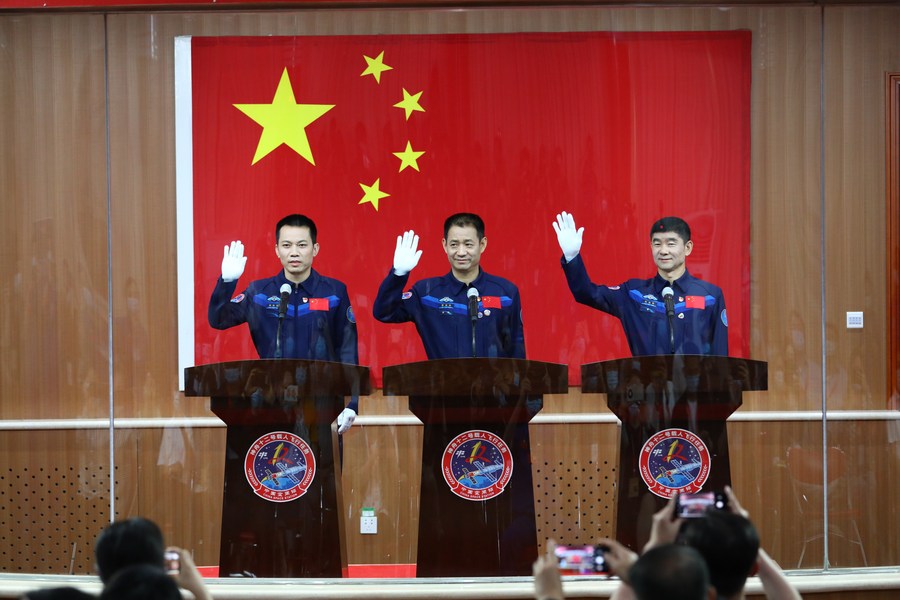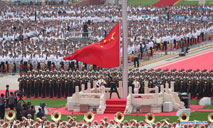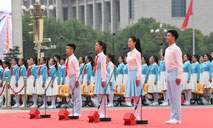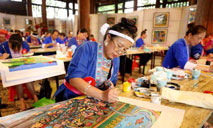Party members dedicated to China's spaceflight missions

Screen image captured at Beijing Aerospace Control Center in Beijing, capital of China, June 17, 2021 shows three Chinese astronauts onboard the Shenzhou-12 spaceship saluting after entering the space station core module Tianhe. (Xinhua/Jin Liwang)
BEIJING, June 28 (Xinhua) -- Upon the centenary of the Communist Party of China (CPC), Chinese astronauts Nie Haisheng, Liu Boming, and Tang Hongbo, all Party members, are busy at in-orbit construction of the country's space station.
As the first astronauts stationed in the space station's core module Tianhe, they shoulder the expectations of the Party and the whole nation -- making pioneering contributions to the peaceful use of space by humanity.
The CPC Constitution stipulates that the Party is the vanguard of the Chinese working class, the Chinese people, and the Chinese nation.
Space exploration is the riskiest and most onerous mission for humanity. China needs its most courageous and capable astronauts to go to space.
Nie joined the Party in 1986, and Liu and Tang in 1990 and 1997, respectively. The trio was sent into space with the Shenzhou-12 spaceship on June 17 and entered the core module several hours later. They will stay in orbit for three months.
SPACE VANGUARD
China's first astronaut Yang Liwei, also a Party member, once said, "like foreign astronauts having their beliefs, we believe in Communism, which is also a spiritual power."
"We do not pray in the way our foreign counterparts do, but the common belief has made us more united in space, where there is no national boundary, to accomplish our missions," Yang added.
China successfully sent Yang into orbit with the Shenzhou-5 spaceship in 2003. It made China the third country to acquire manned space travel technology.

File photo taken on Oct. 15, 2003 shows China's first astronaut Yang Liwei on board Shenzhou-5 displays flags of China and the United Nations. (Xinhua/Zhao Jianwei)
Yang once recalled that something unexpected happened during the country's first manned space flight. He encountered low-frequency resonance during the flight, which can potentially harm internal organs.
"The feeling caused by resonance aboard the spacecraft almost killed me," Yang said.
But no dangers could stop the Chinese pursuit of their space dream. After returning to Earth, Yang told space engineers the problem, which was solved and avoided in later missions. More Chinese astronauts have since flown into space, achieving breakthroughs.
DEDICATION TO MISSION
Nie Haisheng, the commander of the Shenzhou-12 crew, is one of China's most experienced astronauts. He had also participated in the Shenzhou-6 mission in 2005 and the Shenzhou-10 mission in 2013.
During his 15-day space trek on Shenzhou-10, Nie conducted the manual space docking. His success could be attributed to his thorough training. He had done more than 2,000 ground simulations, achieving 100 percent accuracy in manual docking before the mission.
In the Shenzhou-12 mission, the crew will carry out a series of technological verification experiments, including two extravehicular activities (EVAs) and robotic arm operations.
Liu Boming carried out EVA work during the Shenzhou-7 mission in 2008. He helped his teammate Zhai Zhigang, also a Party member, perform a landmark 20-minute spacewalk.

The video grab taken on Sept. 27, 2008 shows Zhai Zhigang waving a China's national flag outside the orbital module of the Shenzhou-7 spacecraft during his spacewalk. (Xinhua/Zha Chunming)
When Zhai was stepping out of the orbital module, a fire alarm rang out. After a thorough check of the spaceship, the astronauts found no trace of fire on board. They decided to carry on the EVA mission anyway.
After Zhai exited the spaceship, Liu handed China's national flag to Zhai. The historical moment, during which Zhai waved the flag through the darkness of space and said hello to the people of China and the world, will be remembered forever.
The fire alarm was later found to be false, caused by a sensor error. But at that time, the astronauts showed the utmost courage to complete the mission. "We made up our mind that even if we couldn't go back (to Earth), we must let the five-star red flag fly in space," Liu said.
SERVE THE PEOPLE
China's manned space program has been led by the CPC from the start.
In September 1992, the CPC Central Committee approved China's manned space program with a three-step strategy.
The first step was to send astronauts into space and return safely. The second step was to test salient technologies needed for a permanent space station, including extra-vehicular activity, orbital docking, and in-orbit propellant refueling. The third step is to assemble and operate a permanently crewed space station, which will mark a new high in China's space technology.
"Without the decision-making and the leadership of the Party, there would be no leaps in China's space industry," said Zhao Xiaojin, Vice President of the China Academy of Space Technology.
The day before the launch of the Shenzhou-12 spaceship, the crew trio made their public debut at the Jiuquan Satellite Launch Center, wearing China's national flag and the Party flag on their uniforms.

Chinese astronauts Nie Haisheng (C), Liu Boming (R) and Tang Hongbo meet the press at the Jiuquan Satellite Launch Center in northwest China, June 16, 2021. (Xinhua/Ju Zhenhua)
Bearing the aim of the CPC -- serving the people -- in mind, the astronauts are expected to carry out space science experiments and technology experiments in the core module, which will ultimately benefit Chinese people and humanity.
Seed breeding, pharmaceutical research, and the development of critical materials in the space station are expected to produce economic benefits. Life support technology and energy technology are also likely to benefit economic and social development.
"It is bound to enrich our understanding of the universe and promote developments in science, technology, and applications," said Zhou Jianping, chief designer of China's manned space program.
"Every step we take forward carries the expectations of the Party, the country, and the people. Every progress we have made also represents the courage and persistence of humanity in exploring space. They will contribute Chinese wisdom and strength to humanity's peaceful use of space," Nie said.
Photos
Related Stories
Copyright © 2021 People's Daily Online. All Rights Reserved.










